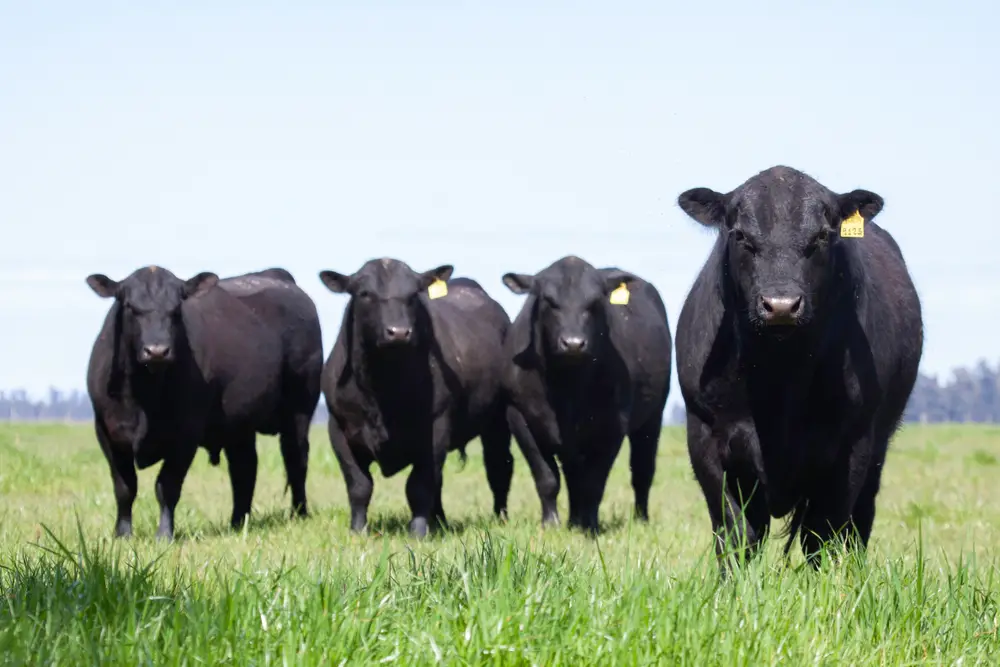The Black Angus cow breed is America's most popular beef breed with strong and ever-increasing demand as consumers seek beef with good marbling and rich flavor and texture.
Here’s an overview of the Black Angus cattle breed to help you decide if it’s right for your farm.
Table of Contents
Where Does The Black Angus Cow Breed Come From?
The Black Angus cattle share a similar history with the Red Angus cattle as descendants of cattle brought by Vikings from Europe to Scotland, where they bred with black Celtic cattle to produce solid black cattle called Aberdeen Angus.
Also called black Aberdeen Angus cattle, black Angus bulls and cows borrow their name from the shires of Aberdeen, Banff, Kincardine, and Angus, where they were locally called the Doddies or the Hummlies.
The Angus cattle were first recognized in 1835 as a breed, although they were formerly registered together with their close relatives, the Galloways, as polled cattle. The first herdbook for the Scottish Aberdeenshire cattle was started in 1862, recording both Red and Black Angus cattle.
Among the earliest and most prominent black Angus herds were the cattle of breeders such as George Grant of Victoria, Kansas, Hugh Watson of Scotland, and William McCombie.
From their origin in northeastern Scotland, Black Angus cows and bulls were imported to Canada, Europe, Africa, Australia, New Zealand, the United Kingdom, Sweden, Germany, Brazil, Denmark, and Spain.
In the US, the first black Angus cattle arrived as George Grant’s herd, which he crossed with Texas Longhorn cattle. The spread of the breed after this led to the formation of the American Angus Association to oversee its development.
Black Angus Cattle Breed Breed Characteristics
Black Angus cattle have the following attributes:
| Official Breed Name | Black Angus Cattle |
| Origin | Scotland |
| Appearance | Medium to large, with a short-stature and compact, low-profile body Solid black color with black skin pigmentation Some have white udders Both bulls and cows are hornless (naturally polled) |
| Calf Weight | 68-77 pounds |
| Mature Cow Weight | 1,210 pounds |
| Mature Bull Weight | 1,870 pounds |
| Ready To Breed | Around 12 months |
| Gestation Period | 9 months |
| First Calvings | Around 21 months |
| Time to Slaughter | 2 years |
| Carcass Weight | Up to 1,050 pounds |
| Expected Lifespan | 14-25 years and productive for at least 14 years |
| Known For | High carcass yield Ease of caring and handling Fairly good milk yield Fast growing and extremely early maturing Large muscles Extreme fertility Ease of calving because the calves are small Good-naturedness, generally, and relative calmness |
| Weaknesses | Angry and aggressive bulls can be challenging for ranchers or farmers to handle singlehandedly |
| Climate | Suitability to cold climates |

What Is So Special About Black Angus Cow Breed?
Black Angus cows and bulls are famous for their natural marbling, which makes the beef stay moist for a long time during cooking. It also makes the meat have a rich texture and flavor.
Angus beef scores Choice or Prime grades from the USDA, which requires Certified Angus beef to have medium to fine marbling texture, a ribeye area of 10 to 16 inches, superior muscling, and a fat thickness below 1 inch.
Black Angus cows are excellent natural mothers with great mothering abilities. They also have easy calvings because the calves are usually small, though they grow fast and reach maturity very early.
The Black Angus breed has a remarkably high tolerance to cold climates, making it the cattle of choice for beef production in areas where temperatures drop to snow levels.
Why Should I Raise Black Angus Cattle On My Farm?
Here are some reasons you might want to raise Black Angus cattle on your farm:
- The US beef cattle industry continues to grow, with a record high of $182 million paid in 2021 to cattlemen for the Certified Angus Beef brand. You could be part of the farmers providing high-quality Angus beef, which is highly demanded because of its natural marbling.
- The black Angus breed is less prone to sun- or snow-burned udders and eye cancer because of their black skin pigmentation. This makes black Angus cows and bulls low-maintenance and slashes vet bills.
- You can make money selling black Angus crosses, which are sought for improved carcass quality, enhanced milking ability, and propagation of the polled gene (passed as a dominant gene for genetic dehorning in other breeds of cattle).
You can make money raising purebred Black Angus bulls for crossbreeding with Brahman to produce Brangus cattle and Hereford heifers to produce Black Baldy.
